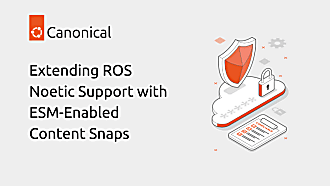Canonical
on 6 February 2025
Canonical achieves ISO/SAE 21434 certification, strengthening automotive cybersecurity standards
Certified cybersecurity processes to help safeguard next-generation connected vehicles
Canonical is proud to announce it has achieved the ISO/SAE 21434 certification for its Security Management System, following an extensive assessment by TÜV SÜD, a globally respected certification provider. This milestone highlights Canonical’s leadership in providing trusted and reliable open source solutions for the automotive sector. It underscores the company’s commitment to three key pillars: robust cybersecurity, alignment with global industry standards, and building a safer future for autonomous and intelligent vehicles.

Robust automotive cybersecurity
As vehicles become increasingly connected, the risks of unauthorized access, remote attacks and data breaches grow significantly. ISO/SAE 21434 provides a detailed framework for managing these risks across the entire vehicle lifecycle. For OEMs and Tier 1 suppliers, compliance is key to delivering products in a competitive marketplace.
Canonical’s ISO/SAE 21434 certification indicates its cybersecurity processes meet the rigorous standards needed to address evolving threats. Automotive partners can confidently integrate the company’s trusted solutions into their systems.
Certified by TÜV SÜD to deliver excellence
Canonical relied on TÜV SÜD’s deep expertise in certification and auditing to achieve ISO/SAE 21434 certification. The intensive assessment validated Canonical’s capabilities in key areas, including threat analysis, risk assessment and incident response.
The certification proves that Canonical’s cybersecurity processes comply with international standards, making it an ideal partner for OEMs and Tier 1 suppliers looking to develop and deploy safer, more resilient automotive products.
Shaping the future of safe, intelligent vehicles
The transformation of the automotive industry—with advancements in autonomous driving, vehicle-to-everything (V2X) communication and AI-powered systems—makes cybersecurity a top priority. Canonical’s certification aligns seamlessly with the company’s work on functional safety under ISO 26262 and contributions to initiatives like the Enabling Linux in Safety Applications (ELISA) project.
To learn more about Canonical and our engagement in automotive:
Download our whitepaper on V2X (Vehicle-to-Everything)




